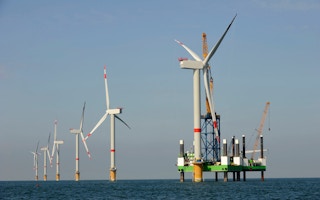One of the most often repeated arguments of the anti-wind lobby is that the turbines produce electricity only intermittently, when there is enough wind to turn them.
This, the critics argue, means that so much gas has to be burnt to provide a reliable supply of electricity that there is no overall benefit to the environment.
But extensive research in Spain means this claim can now definitively be declared a myth. Wind, the researchers found, is a very efficient way of reducing carbon dioxide emissions.
A study of 87 of the country’s coal and gas plants and how they were run alongside Spain’s very large wind industry found that adjustments made to the fossil fuel plants to compensate for variable wind strengths made little difference to their C02 emissions.
The anti-wind campaigners claim that fossil fuel plants have to be kept running at a slow speed, all the time producing CO2, just in case the wind fails. At slow speeds these plants are less efficient and so produce so much CO2 – the opponents of wind say – that they wipe out any gains from having wind power.
But a report published in the journal Energy by researchers at the Universidad Politécnica de Madrid says this is simply not true. There are some small losses, the researchers say, but even if wind produced as much as 50% of Spain’s electricity the CO2 savings would still be 80% of the emissions that would have been produced by the displaced thermal power stations.
At lower penetrations, particularly when the number of wind turbines was small, each megawatt hour produced by wind replaced 100% of the CO2 that would have been produced by each displaced thermal megawatt.
Mutual support
This is the opposite of reports reproduced repeatedly by right-wing think tanks and campaigners opposed to renewables.
The Spanish report adds that even the small losses caused by running thermal power plants at less than maximum efficiency to safeguard the grid if the wind drops can be reduced by better management of renewables. Spain for example has wind, solar and wave power among its portfolio of renewables, each of which can support the others.
The findings are important for governments trying to calculate the amount of CO2 they have saved by the introduction of wind power. Countries like Spain, which are struggling to meet EU targets on reducing emissions, need to know how much CO2 saved can be credited to their wind industries. This research provides the answers.
The paper says: “The finding has generated the first comprehensive analysis on interaction between wind parks and thermal power plants in Spain and has concluded that the global balance of CO2 reduction is still significant. Besides, the study suggests how to enhance the effectiveness of potential sources that can be helpful for promoters of renewable technologies.
“Renewable energy is capable of replacing fossil fuels and of reducing emissions dramatically.”










